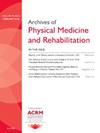NIDILRR ARRT: Assessing Mobile Device Proficiency for a Smart Home Intervention in Individuals with Complex Disabilities
IF 3.6
2区 医学
Q1 REHABILITATION
Archives of physical medicine and rehabilitation
Pub Date : 2025-04-01
DOI:10.1016/j.apmr.2025.01.005
引用次数: 0
Abstract
Objectives
To determine whether an observation-based mobile device assessment is needed to assess mobile device skills of individuals with complex disabilities and used for treatment planning for using smart devices.
Design
This case series study, part of a larger research project, involved participants completing a short version of the Mobile Device Proficiency Questionnaire (MDPQ-16) and participating in an observational assessment of mobile device skills. The assessment included 5 tasks and observational guidelines on device positioning, manual and voice access, and cognitive aspects.
Setting
Participants’ homes.
Participants
A convenience sample of 13 individuals who use a power wheelchair and have difficulty independently controlling or accessing their environment.
Interventions
Not applicable.
Main Outcome Measures
MDPQ-16 and identified mobile device skill performance.
Results
Eleven out of 13 participants completed the MDPQ-16, with an average score of 31±9 (range, 16-40; maximum 40 for top proficiency). Twelve completed the mobile device assessment. Five used Android and 8 used iOS. Five used voice input (voice control and voice assistant), 4 used touch, and 2 used both methods. Five participants (MDPQ range, 36-40) had no noted difficulties during mobile device assessment. The other 8 (MDPQ range, 16-39) exhibited diverse device skill performance stemming from device mounting and positioning challenges, motor impairments affecting touch gesture and/or typing precision, limited familiarity with the accessibility features, insufficient digital literacy, and outdated devices lacking necessary features.
Conclusions
Relying solely on the MDPQ-16 yielded inadequate insight into participants’ mobile device skills. The observation-based mobile device assessment revealed specific areas of knowledge or functional gaps, enabling clinicians to tailor necessary skill training and adaptation recommendations. The MDPQ-16 is an inadequate assessment to use alone when understanding participants’ mobile device skills but should be used in conjunction with an observation-based mobile device assessment to ensure foundational mobile device proficiency is achieved prior to smart technology training.
Disclosures
Gina Novario, OTD, OTR/L, is the current Advanced Rehabilitation Research and Training Fellow in the Department of Rehabilitation Science and Technology at the University of Pittsburgh. She graduated from Slippery Rock University in 2021 with her Doctorate in Occupational Therapy. She is currently on the Smart Home Service Delivery and Funding and Policy Study Projects at the University of Pittsburgh's Rehabilitation Engineering Research Center on Wireless Technologies for People with Disabilities.
目标确定是否需要基于观察的移动设备评估来评估复杂残疾人士的移动设备技能,并用于制定使用智能设备的治疗计划。设计本案例系列研究是一项大型研究项目的一部分,参与者需要完成移动设备能力问卷(MDPQ-16)的简短版本,并参与移动设备技能的观察评估。评估包括 5 项任务以及关于设备定位、手动和语音访问以及认知方面的观察指南。结果13 名参与者中有 7 人完成了 MDPQ-16,平均得分为 31±9(范围为 16-40;最高 40 为最高熟练程度)。12人完成了移动设备评估。其中 5 人使用安卓系统,8 人使用 iOS 系统。5 人使用语音输入(语音控制和语音助手),4 人使用触摸,2 人同时使用两种方法。在移动设备评估过程中,5 名参与者(MDPQ 范围为 36-40)没有遇到明显的困难。其他 8 位参与者(MDPQ 范围为 16-39)的设备技能表现各不相同,原因包括设备安装和定位困难、运动障碍影响触摸手势和/或打字精确度、对无障碍功能的熟悉程度有限、数字素养不足以及设备过时缺乏必要功能。以观察为基础的移动设备评估揭示了特定领域的知识或功能差距,使临床医生能够定制必要的技能培训和适应建议。在了解参与者的移动设备技能时,单独使用 MDPQ-16 评估是不够的,而应与基于观察的移动设备评估结合使用,以确保在进行智能技术培训之前,参与者已具备基本的移动设备技能。她于 2021 年毕业于滑石大学,获得职业治疗博士学位。她目前在匹兹堡大学残疾人无线技术康复工程研究中心从事智能家居服务交付和资金与政策研究项目。
本文章由计算机程序翻译,如有差异,请以英文原文为准。
求助全文
约1分钟内获得全文
求助全文
来源期刊
CiteScore
6.20
自引率
4.70%
发文量
495
审稿时长
38 days
期刊介绍:
The Archives of Physical Medicine and Rehabilitation publishes original, peer-reviewed research and clinical reports on important trends and developments in physical medicine and rehabilitation and related fields. This international journal brings researchers and clinicians authoritative information on the therapeutic utilization of physical, behavioral and pharmaceutical agents in providing comprehensive care for individuals with chronic illness and disabilities.
Archives began publication in 1920, publishes monthly, and is the official journal of the American Congress of Rehabilitation Medicine. Its papers are cited more often than any other rehabilitation journal.

 求助内容:
求助内容: 应助结果提醒方式:
应助结果提醒方式:


